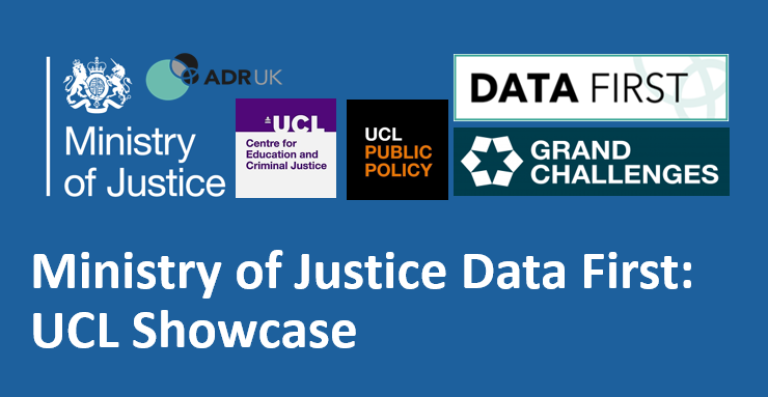How to Access and Use Ministry of Justice Datasets for Academic Research
18 March 2024
This showcase invited Ministry of Justice analysts to provide an overview of the datasets available to researchers as part of its Data First programme on 20 March. A summary of the event can be found below.

The showcase was in collaboration between the Ministry of Justice (MoJ) and the UCL Centre for Education and Criminal Justice (ECJ) and supported by UCL Public Policy and UCL Grand Challenge of Justice and Equality.
Data First is a ground-breaking data linkage programme led by the MoJ and funded by ADR UK (Administrative Data Research UK) to link and enable access to administrative data from across the justice system and beyond for research. MoJ analysts provided an overview of the datasets the department makes available to researchers. The programme includes linked data from the magistrates’ courts, Crown Court, prison and probation services, civil courts, and family courts, as well as linked Family Courts-Cafcass and Census 2021 datasets and Ministry of Justice-Department for Education datasets, which joins the Police National Computer (PNC) to the National Pupil Database (NPD). The Offender Assessment System (OASys) dataset will be available soon.
Using a probabilistic matching algorithm platform called Splink, it enables analysis of the users’ journeys, interactions, and pathways across the system and with a range of other public services, including education and employment. There are over 110 million records linked across the justice system.
- The MoJ Cross-Justice linked dataset joins data from criminal courts, prison and probation services, and civil and family courts. This linkage enables research on which individuals reappear in various parts of the justice system, questions about the overlaps and intersections between users of services in different justice jurisdictions, and their journeys and pathways.
- The Data First Family Court–Cafcass and Census linked dataset contains information on adoption, divorce, Family Law Act, public law, and private law cases and their legal outcomes in England and Wales. Available via the SAIL Databank, the de-identified linked dataset permits unprecedented research of the family and household characteristics of family court users.
- The Ministry of Justice & Department for Education linked dataset allows analysis of the links between childhood characteristics, educational outcomes and (re)offending. The dataset includes data from prisons, courts, the Police National Computer, the National Pupil Database, looked-after-children, and children in need.
The MoJ Areas of Research Interest (2020) outlined the high-level areas of research interest for MoJ intending to support ongoing and new engagement with the external research community. Data First can help us address some of the research priorities outlined in the ARI but connects with academics to fill in the evidence gaps.
Researchers who wish to receive access to Data First datasets, either through the ONS SRS or SAIL Databank, will need to be accredited researchers and complete several application forms linked in the attached presentation. The Data First team can support researchers in the application process or discuss the feasibility of projects.
The audience received a practical demonstration of the data. Also, the audience heard from two academic researchers who used the linked data within their research:
- Dr Georgina Mathlin (Data First Evaluation Fellowship) shared her project: “Using linked administrative data to evaluate policy interventions in the justice system” and a related blog post.
- Dr Tim McSweeney (ADR UK Data First Fellowship) discussed his project: “A national data linkage study to assess the extent, nature, and outcomes of ‘serious and organised crime’ prosecuted before the criminal courts in England and Wales.” More information about his work can be found here.
To finish, MoJ shared the ADR UK 2024 Research Fellowship for those interested in researching and analysing ADR England datasets. The Research Fellowships can be up to 18 months in duration and up to a maximum of £200,000 at 100% economic cost. MoJ is hosting drop-in sessions for researchers interested in using Data First datasets. This funding opportunity has a mandatory register of interest stage, which closed at 16:00 on 28 March 2024.
 Close
Close

